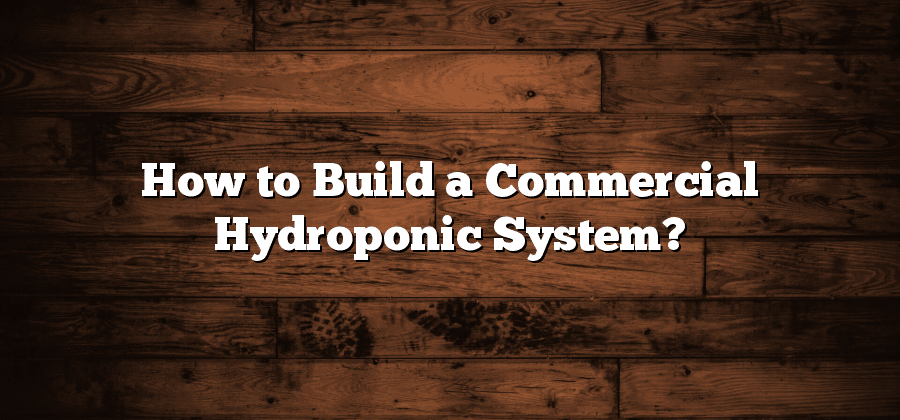Understanding the Benefits of Hydroponic Systems
Hydroponic systems have gained immense popularity in the realm of agriculture due to their numerous benefits. One of the key advantages of hydroponics is the efficient use of water. Unlike traditional soil-based gardening methods, hydroponic systems require only a fraction of the water to produce the same yield. This is because the water in a hydroponic system is recirculated, reducing the water wastage significantly. Additionally, hydroponic systems eliminate the need for soil, which not only conserves land resources but also reduces the risk of soil-borne pests and diseases. This makes hydroponic systems ideal for urban areas or regions with poor soil quality.
Another benefit of hydroponics is the ability to control and optimize nutrient levels. In a traditional soil-based garden, plants rely on the nutrients naturally found in the soil. However, this can lead to imbalances or deficiencies in certain nutrients, resulting in stunted growth or poor productivity. In hydroponic systems, nutrients are delivered directly to the plant roots through a nutrient solution, allowing for precise control over the nutrient levels. This ensures that plants receive the ideal balance of nutrients required for optimal growth and development. By fine-tuning the nutrient composition, hydroponic systems enable growers to achieve higher yields and produce healthier, nutrient-rich crops.
Selecting the Right Location for Your Commercial Hydroponic System
When it comes to setting up a commercial hydroponic system, one of the most crucial aspects to consider is selecting the right location. The success of your hydroponic venture largely depends on the environment in which it is situated, so careful evaluation is necessary to ensure optimal conditions for plant growth.
First and foremost, it is important to find a location that receives ample sunlight throughout the day. Natural light is essential for the growth and development of plants, and without enough exposure, they may struggle to thrive. Look for an area with unobstructed access to sunlight, such as a rooftop or an open field. Additionally, consider the orientation of the location to maximize the amount of sunlight received during key periods, such as morning or afternoon. Once you have identified a site that meets these requirements, you can move on to evaluating other factors such as access to water, proximity to markets, and the availability of necessary utilities.
Choosing the Appropriate Hydroponic System Design
There are several factors to consider when choosing the appropriate hydroponic system design for your commercial operation. First and foremost, it is important to identify the specific needs and requirements of the crops you will be growing. Each crop has different nutrient requirements, environmental needs, and growth habits, which will influence the type of system that is best suited for them.
Additionally, the available space and resources must be taken into account when selecting a hydroponic system design. Consider the size of your facility, the amount of water and electricity available, and any other limitations that may impact the design and functionality of the system. It is also essential to assess the level of automation and control you desire for your operation, as this will influence the selection of a suitable system design.
Overall, choosing the appropriate hydroponic system design requires careful consideration of crop requirements, available resources, and desired level of automation. By selecting a design that aligns with these factors, you can optimize plant growth and productivity in your commercial hydroponic operation.
Gathering the Essential Materials and Equipment for Construction
To successfully construct a commercial hydroponic system, gathering the essential materials and equipment is a crucial first step. These items will lay the foundation for a well-functioning and efficient system that can support the growth and development of your plants. When selecting materials, it is essential to prioritize quality and durability to ensure the longevity of your system.
One of the key materials you will need is a large reservoir to store and distribute the nutrient solution. This reservoir should be constructed from a food-grade material such as polyethylene to prevent any contamination of the solution. Additionally, you will require sturdy and durable trays or containers to hold the growing media and support the plants. Opt for trays made from materials like PVC or HDPE, as they are resistant to corrosion and can withstand the weight of the growing media.
Constructing the Framework for Your Commercial Hydroponic System
When it comes to constructing the framework for your commercial hydroponic system, there are several factors to consider. First and foremost, you must ensure that you have a solid and stable foundation to support the weight of the system. This can be achieved by using sturdy materials such as steel or concrete for the base.
Next, you will need to determine the layout and structure of your hydroponic system. This will depend on the size of your operation and the type of crops you plan to grow. You may choose to use a vertical system, utilizing vertical space efficiently, or a horizontal layout for easier access and maintenance. Regardless of the design, it is crucial to ensure that the framework is strong enough to withstand the weight of the plants and the equipment needed for their growth.
Once you have finalized the design and structure of your hydroponic system, it is time to start the construction process. This typically involves assembling the framework, connecting the various components, and securing them in place. It is essential to follow the manufacturer’s instructions and guidelines for assembly to ensure the system’s proper functionality and longevity.
In the next section, we will discuss the various components and equipment required for your commercial hydroponic system. From grow lights to nutrient solution reservoirs, we will guide you through the essential materials needed to set up a successful and thriving hydroponic operation.






